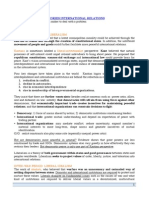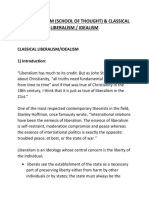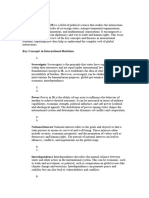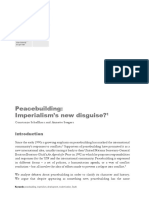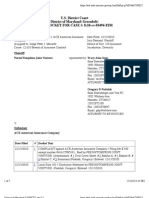Liberalism
Liberalism
Uploaded by
Nafis FuadOriginal Description:
Copyright
Available Formats
Share this document
Did you find this document useful?
Is this content inappropriate?
Report this DocumentCopyright:
Available Formats
Liberalism
Liberalism
Uploaded by
Nafis FuadCopyright:
Available Formats
Intro to IR Theories
Liberalism:
Origin: During eighteenth and nineteenth centuries liberal philosophers debated the difficulties
of establishing just, orderly and peaceful relations between peoples. One of the most systematic
and thoughtful accounts of the problems of world peace was produced by the German
philosopher Immanuel Kant in 1795 in an essay entitled Perpetual Peace. . Kantian thought has ‘Liberal pluralists’
pointed to the
been profoundly influential in the development of liberalism in IR. growing
Important Philosophers: Immanuel Kant, Adam Smith, David Ricardo, Jeremy Bentham, John importance of
multinational
Stuart Mill and John Maynard Keynes. corporations
Core Concept: This liberal or idealist enterprise rested on the beliefs that people in general are (MNCs), non-
governmental
inherently good and have no interest in prosecuting wars with one another. Furthermore, people organizations
suffer greatly as a consequence of war and thus desire dialogue over belligerence. Therefore, for (NGOs), pressure
groups, and
idealists all that was needed to end war was respect for the rule of law and stable institutions intergovernmental
which could provide some form of international order conducive to peace and security. organizations
(IGOs), as evidence
Following the Second World War, idealism fell out of favour for a long period of time. The that states were
decline in the popularity of idealism was partly encouraged by the failure of The League of no longer the only
significant actors
Nations to act as a forum for resolving differences peacefully and as a mechanism to prevent in international
inter-state conflict. relations
There have been many innovations in liberal theory since the 1970s. For example, idealism,
pluralism, interdependence theory, transnationalism, liberal internationalism, liberal peace theory,
neo-liberal institutionalism and world society approaches.
Liberal internationalism: the belief that political activity should be framed in terms of a
universal human condition rather than in relation to the particularities of any given nation.
Liberalism has something to say about all aspects of human life. In terms of liberal philosophy,
liberalism is based upon a belief in the inherently good nature of all humans, the ultimate value of
individual liberty and the possibility of human progress. Liberalism speaks the language of
rationality, moral autonomy, human rights, democracy, opportunity and choice and is founded
upon a commitment to principles of liberty and equality, justified in the name of individuality and
rationality.
Contributions of Liberalism in Economic and Political ground:
1. Political Liberalism: Kant argued that perpetual peace cannot be realized in an unjust
world. The only way that this state of affairs could be overcome would be for states to found
a ‘state of peace’. Kant did not envisage the founding of a world government, or even the
pooling of sovereignty, but, rather, a looser federation of free states governed by the rule of
law. Kant recognized that, in order to achieve a just world order, certain conditions were
necessary, including the establishment of republics, as opposed to monarchies or
dictatorships. Kant recognized that, in order to achieve a just world order, certain conditions
were necessary, including the establishment of republics (used to describe a secular state in
which there is a separation of powers in government and in which citizens are ruled by law
and have some constitutional rights), as opposed to monarchies or dictatorships. If this was
the case a world federation would only be achieved when all states were republics.
2. Economic Liberalism:
It is rooted in an intellectual works of Adam Smith and David Ricardo. The key
assumptions of nineteenth-century classical liberalism were that it is, in the long
run, beneficial to all if markets are allowed to operate freely without state
intervention and if countries are able to trade openly and freely with each other. the
market is seen as the most efficient means of organizing human production and
exchange, operating almost as if ‘an invisible hand’ were guiding and coordinating
economic activity. If the free market is allowed to operate without government
intervention, there will be the efficient division and distribution of labor and
resources both within domestic economies and the international economic system.
This does not mean that liberals see no role for the state in the economy. Adam
Smith accepted that the market would not necessarily produce much needed ‘public
goods’ and that governments would need to provide them. States were also
necessary, because they provided a regulatory framework – a legal system – to,
among other things, enforce contracts and protect against corruption and unfair
competition and they held that it is in the best interests of all people, in the long
term, if state intervention is kept to a minimum.
According to liberals, the advantages of trade are numerous. Trade would prove to
be mutually beneficial by, for example, bringing about interdependence among
states and generating wealth, both of which would reduce the likelihood of conflict.
This is because, in the case of the former, integration between states and people
leads to shared interests and an increase in the costs of conflict.
The Bretton Woods System (BWS) was to facilitate economic growth, development
and trade by providing a stable framework for international economic activity. It
was believed that, when the economic climate was harsh, states immediately took
action to protect their own economies. Typically, this involved measures to protect
domestic markets, such as increasing tariffs. The knock-on effects of such ‘selfish’
behaviour were a slow-down in world trade and, eventually, international recession.
The BWS was designed to create a framework in which it would be difficult for
states to act in a self-interested way when the going got tough by, at one and the
same time, discouraging protectionism and providing a helping hand to countries in
temporary economic difficulties.
The BWS consisted of the International Bank for Reconstruction and Development
(IBRD), the International Monetary Fund (IMF) and later the General Agreement on
Tariffs and Trade (GATT), now the World Trade Organisation (WTO).
In the first years of its existence, it was envisaged that the IBRD, more commonly
known as the World Bank, would play an important role in distributing aid to the
devastated economies of Western Europe.
The International Monetary Fund was designed to ensure liquidity in the
international economy. This means that, in effect, countries experiencing short-term
balance of trade difficulties (effectively spending more than they were earning)
could borrow money and so continue to trade effectively.
General Agreement in Tariffs and Trade (which came into being a few years after
Bretton Woods and has since been superseded by the World Trade Organization)
was designed to bring about a gradual reduction in trade barriers around the world.
Neo-liberal or neo-classical economic theory has been used to justify structural
adjustment programmers (SAPs) in the developing world, even though the social
consequences may be very harsh indeed. SAPs have been widely ‘recommended’ to
Third World states by the IMF and the World Bank as an effective means of dealing
with the related problems of poverty and indebtedness. SAPs have been heavily
criticized by NGOs like Oxfam and Greenpeace as well as by former members of the
World Bank. Consequently SAPs often include some notional safety net beyond
which basic services and welfare goods should not be cut.
John Stuart Mill, argued that government was a necessary evil. That is to say,
government was necessary in order to protect the liberty of individuals, but could
become oppressive and tyrannical if its power was unchecked. For these reasons
liberals generally argue for a ‘separation of powers’ and ‘checks and balances’ which
ensure that no one political leader or arm of government can become dominant.
This basic idea is the origin of political pluralism, which means the distribution or
diffusion of power across a range of institutions or among a number of ‘actors’
You might also like
- Gap All PDFDocument139 pagesGap All PDFdavonesNo ratings yet
- Assessment of LearningDocument10 pagesAssessment of LearningNico John Bauzon Capua100% (3)
- Introduction To International Conflict ManagementDocument34 pagesIntroduction To International Conflict ManagementkimenderoNo ratings yet
- Hotel Reservation System DFDDocument2 pagesHotel Reservation System DFDwaachathura63% (8)
- LIBERALISMDocument14 pagesLIBERALISMSharad panwarNo ratings yet
- Week 4 - The Problem of Cooperation and Peace - LiberalismDocument33 pagesWeek 4 - The Problem of Cooperation and Peace - Liberalismjordan25_93_75673196No ratings yet
- LiberalismDocument59 pagesLiberalismAmrat KukrejaNo ratings yet
- Theories International RelationsDocument13 pagesTheories International Relationsvioleta_jrNo ratings yet
- Week 1Document31 pagesWeek 1shinaejjjNo ratings yet
- Theoretical Foundations OnDocument17 pagesTheoretical Foundations OnAli Azam KhanNo ratings yet
- The Global Interstate SystemDocument28 pagesThe Global Interstate SystemTam Tam80% (5)
- Neo-Liberalism (School of Thought) & Classical Liberalism / IdealismDocument8 pagesNeo-Liberalism (School of Thought) & Classical Liberalism / IdealismGhazali BalochNo ratings yet
- 4.a) Idealism in International RelationsDocument3 pages4.a) Idealism in International RelationsSheher Yar Khan100% (1)
- Develpment and Liberal PeaceDocument16 pagesDevelpment and Liberal PeaceluciaexpNo ratings yet
- Pillars of StateDocument5 pagesPillars of StateAmara ArshadNo ratings yet
- LIBERALISMDocument13 pagesLIBERALISMBrinda SharmaNo ratings yet
- LiberalismDocument9 pagesLiberalismYves TufenkjianNo ratings yet
- Liberal TheoryDocument6 pagesLiberal Theoryonyinyechi.ike-osemehaNo ratings yet
- Liberalism and The Emergence of International RegimesDocument8 pagesLiberalism and The Emergence of International RegimesSaulNo ratings yet
- LiberalismDocument3 pagesLiberalismHaseeb AkbarNo ratings yet
- Liberalism TheoryDocument6 pagesLiberalism TheoryDr StrangeNo ratings yet
- nOTes Int RelDocument12 pagesnOTes Int RelDua BalochNo ratings yet
- Interstate SystemDocument2 pagesInterstate SystemRenneth Rea FloresNo ratings yet
- Liberalism - Part 2Document22 pagesLiberalism - Part 2Alara MelnichenkoNo ratings yet
- IPE 2023 Week 2 Lecture SlidesDocument34 pagesIPE 2023 Week 2 Lecture SlidesVioleta DíezNo ratings yet
- Liberalism Lecture PresentationDocument48 pagesLiberalism Lecture PresentationRahmatahir Rahma100% (2)
- The Global Interstate SystemDocument30 pagesThe Global Interstate SystemAndrea SiladanNo ratings yet
- The Theoretical Foundations of Global Governance - LiberalismDocument26 pagesThe Theoretical Foundations of Global Governance - Liberalism_Q__4413100% (9)
- International RelationDocument3 pagesInternational Relationtejukaki0No ratings yet
- Peacebuilding: Imperialism's New Disguise?: Annette Seegers Constanze SchellhaasDocument14 pagesPeacebuilding: Imperialism's New Disguise?: Annette Seegers Constanze SchellhaasGertrude RosenNo ratings yet
- International RelationsDocument44 pagesInternational RelationsRoger Nino AlvarezNo ratings yet
- Liberalism and Neo-LiberalismDocument18 pagesLiberalism and Neo-LiberalismAli Zafar100% (2)
- International Relations ReportDocument51 pagesInternational Relations ReportWoniefiedNo ratings yet
- 372 SESSION 7 - LIBERALISM (First Part)Document10 pages372 SESSION 7 - LIBERALISM (First Part)Yocelin AbadNo ratings yet
- The Passage Discusses The Concept of Liberalism in International RelationsDocument2 pagesThe Passage Discusses The Concept of Liberalism in International RelationsMena TesfayeNo ratings yet
- AIE2002 Week4 NeoliberalismDocument18 pagesAIE2002 Week4 NeoliberalismSha NinaNo ratings yet
- Middle of The Term Summative AssessmentsDocument4 pagesMiddle of The Term Summative AssessmentsCian TolosaNo ratings yet
- Lect-2 Key International ConceptsDocument24 pagesLect-2 Key International ConceptsSaima BatoOlNo ratings yet
- Unit 4-The Global Interstate SystemDocument7 pagesUnit 4-The Global Interstate SystemJames Conrad Salenga100% (1)
- Conworld Reviewer For MDTDocument7 pagesConworld Reviewer For MDTUnnamed homosapienNo ratings yet
- Conw RebyuwerDocument24 pagesConw RebyuwerTino SorianoNo ratings yet
- Introducing Liberalism in International Relations TheoryDocument4 pagesIntroducing Liberalism in International Relations TheoryCanaanNo ratings yet
- Ir TheoryDocument43 pagesIr TheoryGuillem Montes FontNo ratings yet
- IR Lec 4 and 5Document5 pagesIR Lec 4 and 5Arsalan AhmedNo ratings yet
- ARTS1810 Lecture Notes Week 4Document9 pagesARTS1810 Lecture Notes Week 4ngraham95No ratings yet
- Module 4 Contemporary World Jru ModuleDocument2 pagesModule 4 Contemporary World Jru Modulekassel PlacienteNo ratings yet
- 409 Mukesh Bagoria 1Document28 pages409 Mukesh Bagoria 1Pradeep DaradeNo ratings yet
- Chapter 1 The Origins of Global CommunityDocument16 pagesChapter 1 The Origins of Global CommunityIvetthe RugeNo ratings yet
- Theories On GovernanceDocument14 pagesTheories On Governancegashaw yematawNo ratings yet
- !theDocument36 pages!thehasanburak241No ratings yet
- Ir Theories ImportantDocument26 pagesIr Theories Importantabbasinoorulhuda25No ratings yet
- International Relations Is An Academic Discipline That Focuses On The Study of The Interaction ofDocument3 pagesInternational Relations Is An Academic Discipline That Focuses On The Study of The Interaction ofabiola soliuNo ratings yet
- One World Many Theories PDFDocument17 pagesOne World Many Theories PDFEva Alam Nejuko ChanNo ratings yet
- State System Final PDFDocument12 pagesState System Final PDFkhadijaNo ratings yet
- Liberalism and International Relation (570) HighlightedDocument6 pagesLiberalism and International Relation (570) HighlightedMannya KhannaNo ratings yet
- Conw Midterms Module 4-6Document26 pagesConw Midterms Module 4-6Veia Monique PaynorNo ratings yet
- 02Document2 pages02Andrea Nicole TaguinesNo ratings yet
- Evolution of International OrganisationsDocument13 pagesEvolution of International OrganisationsDr. Afroz Alam88% (26)
- In Defense of The Liberal PeaceDocument6 pagesIn Defense of The Liberal PeaceQuinn ZimmermanNo ratings yet
- PDF HandlerDocument51 pagesPDF HandlerFernando AmorimNo ratings yet
- I.R Chapter 3Document9 pagesI.R Chapter 3mariamo IoselianiNo ratings yet
- The Global Conspiracy Exposed: The Collusion of The World Government, The Elite, and Agenda 21 and the Veracity of the Fallen Angels and UFO'sFrom EverandThe Global Conspiracy Exposed: The Collusion of The World Government, The Elite, and Agenda 21 and the Veracity of the Fallen Angels and UFO'sNo ratings yet
- Towards a New World Order: Uniting for a More Peaceful, Just and Equitable SocietyFrom EverandTowards a New World Order: Uniting for a More Peaceful, Just and Equitable SocietyNo ratings yet
- Political Views of MachiavelliDocument5 pagesPolitical Views of MachiavelliNafis FuadNo ratings yet
- Ayub Regime and The End of 108 CourseDocument2 pagesAyub Regime and The End of 108 CourseNafis FuadNo ratings yet
- Demand For Pakistan and PartitionDocument3 pagesDemand For Pakistan and PartitionNafis FuadNo ratings yet
- Punjabization of Indian Army, Martial Race, Building of Canal Colonies Subhas Chandra and INADocument3 pagesPunjabization of Indian Army, Martial Race, Building of Canal Colonies Subhas Chandra and INANafis FuadNo ratings yet
- Bharat Sanchar Nigam Limited: Form For Fiber Based Services New Connection Companies/ Organizations IndividualsDocument4 pagesBharat Sanchar Nigam Limited: Form For Fiber Based Services New Connection Companies/ Organizations IndividualsChander MohanNo ratings yet
- TN Basic Training-OptiX OSN 8800 (OCS) Operation and Maintenance Training PDFDocument1 pageTN Basic Training-OptiX OSN 8800 (OCS) Operation and Maintenance Training PDFJesus RosalesNo ratings yet
- AirportDocument32 pagesAirportAlejandro RodriguezNo ratings yet
- G EngcoursesDocument61 pagesG EngcourseskractheworldNo ratings yet
- RAB Pekerjaan Cover ManholeDocument2 pagesRAB Pekerjaan Cover ManholeAdhe Ahmad YazidNo ratings yet
- Recruitment Process Study As Part of The Talent Management Process (Comparative Case Study of PT. Astra Indonesia Tbk. and PT. Garuda Indonesia)Document8 pagesRecruitment Process Study As Part of The Talent Management Process (Comparative Case Study of PT. Astra Indonesia Tbk. and PT. Garuda Indonesia)Niel TalentlyticaNo ratings yet
- RRU3832 Description: Huawei Technologies Co., LTDDocument15 pagesRRU3832 Description: Huawei Technologies Co., LTDJhordan Felipe100% (1)
- Loadsheet - 2802 Lemd-Ebbr 28aug13Document1 pageLoadsheet - 2802 Lemd-Ebbr 28aug13Mario Pérez PérezNo ratings yet
- sp14q006 HITACHIDocument23 pagessp14q006 HITACHImuzakki firmanNo ratings yet
- Golf Guide 2023Document8 pagesGolf Guide 2023inforumdocsNo ratings yet
- MS WORD Exercise-1 Almazan & de LunaDocument7 pagesMS WORD Exercise-1 Almazan & de Lunamagerlon de lunaNo ratings yet
- PERINI/TOMPKINS JOINT VENTURE v. ACE AMERICAN INSURANCE COMPANY DocketDocument2 pagesPERINI/TOMPKINS JOINT VENTURE v. ACE AMERICAN INSURANCE COMPANY DocketACELitigationWatchNo ratings yet
- S50-Ma - Straight m18 Photoelectric Sensor 1632958-305278Document5 pagesS50-Ma - Straight m18 Photoelectric Sensor 1632958-305278mateusT850No ratings yet
- The Effects of Cognitive Apprenticeship and Co-Regulated Learning On Improving Student Computer Problem-Solving Skills and Learning MotivationDocument16 pagesThe Effects of Cognitive Apprenticeship and Co-Regulated Learning On Improving Student Computer Problem-Solving Skills and Learning MotivationYing-Tien WUNo ratings yet
- PDF Game Engine Black Book Doom V1 1 Fabien Sanglard Ebook Full ChapterDocument53 pagesPDF Game Engine Black Book Doom V1 1 Fabien Sanglard Ebook Full Chaptersteve.murrietta889100% (5)
- Earthquake Resistant Building: Iqra Javed 3 ADocument16 pagesEarthquake Resistant Building: Iqra Javed 3 AIqRa JaVedNo ratings yet
- AMOUR WINE PPT FinalDocument45 pagesAMOUR WINE PPT Finalyatin rajputNo ratings yet
- Explain Datapath in Pipeline or Pipelined Datapath?Document4 pagesExplain Datapath in Pipeline or Pipelined Datapath?Loganathan RmNo ratings yet
- Chapter5 DJF51082Document6 pagesChapter5 DJF51082Fiq IFTNo ratings yet
- Assassin ASN-101Document1 pageAssassin ASN-101Matt HIckeyNo ratings yet
- Helix HX7 SP 10W-30 (SP GF-6A)Document2 pagesHelix HX7 SP 10W-30 (SP GF-6A)rstec pyNo ratings yet
- Jan 2009 Shrewsbury Friends of The Earth NewsletterDocument4 pagesJan 2009 Shrewsbury Friends of The Earth NewsletterShrewsbury Friends of the EarthNo ratings yet
- Corporate Branding PresentationDocument6 pagesCorporate Branding PresentationFortunateNo ratings yet
- BOL1219 A Leaflet190109Document2 pagesBOL1219 A Leaflet190109servicibsNo ratings yet
- City of San Antonio Master PlanDocument72 pagesCity of San Antonio Master PlanRick De La CruzNo ratings yet
- Foreign Aid To BangladeshDocument3 pagesForeign Aid To BangladeshPushpa BaruaNo ratings yet
- Guide To A Lawsuit (WIP)Document2 pagesGuide To A Lawsuit (WIP)pluto zalatimoNo ratings yet







